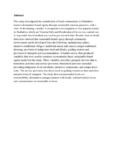Please use this identifier to cite or link to this item:
https://cris.library.msu.ac.zw//handle/11408/4309Full metadata record
| DC Field | Value | Language |
|---|---|---|
| dc.contributor.author | Chigora, Farai | - |
| dc.contributor.author | Mutambara, Emmanuel | - |
| dc.contributor.author | Ndlovu, Joram | - |
| dc.contributor.author | Muzurura, Joe | - |
| dc.contributor.author | Zvavahera, Promise | - |
| dc.date.accessioned | 2021-06-01T10:54:06Z | - |
| dc.date.available | 2021-06-01T10:54:06Z | - |
| dc.date.issued | 2020 | - |
| dc.identifier.issn | 2223-814X | - |
| dc.identifier.uri | https://www.researchgate.net/publication/347517427_Towards_Establishing_Zimbabwe_Tourism_Destination_Brand_Equity_Variables_through_Sustainable_Community_Involvement/link/5fe04b0745851553a0db4e4d/download | - |
| dc.identifier.uri | http://hdl.handle.net/11408/4309 | - |
| dc.description.abstract | The study investigated the contribution of local communities to Zimbabwe tourism destination brand equity through sustainable tourism practices, with a view of developing a model. A comparative investigation of two popular resorts in Zimbabwe which are Victoria Falls and Domboshava Curves was carried out. A sequential mixed method was used to get research data. Results from in-depth interviews showed that sustainable brand equity through community involvement can be developed from the following: maintaining culture; attractive traditional villages; traditional music and dances; unique traditional dressing; provision of indigenous food and drinks; guiding tourists and provision of transport and accommodation. A further survey then produced variables that were used to construct a community based sustainable brand equity model for the study. These variables were then grouped into two that is, household activities and service provision. Household activities included: providing indigenous food and drinks; attractive homesteads; and unique dress code. The service provision was discovered as guiding tourists in their activities and provision of transport. The study then recommended local eco-responsibility, destination manager partner with locals, cultural tourism focus and customisation of sustainable tourism. | en_US |
| dc.language.iso | en | en_US |
| dc.publisher | Africa Journals | en_US |
| dc.relation.ispartofseries | African Journal of Hospitality, Tourism and Leisure;Vol.9 ; No.5 : p. 1094-1110 | - |
| dc.subject | Community involvement | en_US |
| dc.subject | branding | en_US |
| dc.subject | sustainable | en_US |
| dc.subject | tourism | en_US |
| dc.subject | brand equity | en_US |
| dc.title | Towards Establishing Zimbabwe Tourism Destination Brand Equity Variables through Sustainable Community Involvement | en_US |
| dc.type | Article | en_US |
| item.openairecristype | http://purl.org/coar/resource_type/c_18cf | - |
| item.fulltext | With Fulltext | - |
| item.languageiso639-1 | en | - |
| item.openairetype | Article | - |
| item.grantfulltext | open | - |
| item.cerifentitytype | Publications | - |
| Appears in Collections: | Research Papers | |
Files in This Item:
| File | Description | Size | Format | |
|---|---|---|---|---|
| muzurura.pdf | Abstract | 5.16 kB | Adobe PDF |  View/Open |
Page view(s)
178
checked on Feb 11, 2026
Download(s)
54
checked on Feb 11, 2026
Google ScholarTM
Check
Items in MSUIR are protected by copyright, with all rights reserved, unless otherwise indicated.



